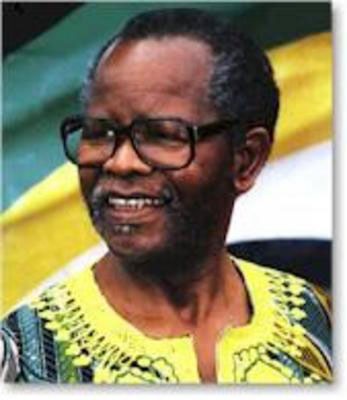
The media has been reporting that ANC leaders told party veterans that they would not be getting a special consultative conference as earlier promised and that their criticisms of the party was exaggerated.
Such a statement reflected a missed opportunity by the incumbent leaders to tap into the experience of its veterans as well as the mass democratic and progressive movement.
During the January 8 statement, President Jacob Zuma announced that the ANC, in its quest to promote unity, enthusiasm and honesty within its structures, would dedicate 2017 to the party’s longest serving leader Oliver Tambo.
OR is described by his peers as a human monument “with no trace whatsoever of arrogance and self-importance – a rare leader of people”.
His irrefutable and indispensable leadership of the ANC emulate a true account of an extraordinary life and a vivid testimony of intelligence, selflessness, principle, dedication, discipline and distinction.
Hence Zuma pledged to ANC membership and citizens in general that the party would emulate Tambo’s wisdom when consolidating the party’s successes and, in particular, dealing with the party’s current challenges.
Consultative conferences remained OR’s leadership genius that kept the ANC united and focused throughout his 24-year tenure as president.
The first consultative conference of the ANC was held in Tanzania from April 25 to May 1 1969, and became known as the “Mogorogo Conference”.
Tambo summarised the resolutions of the conference with these words: “The order that comes from the conference is ‘close ranks and intensify the armed struggle’.
This is the order to our people, our youth, the army, to each Umkhonto weSizwe militant, to all our many supporters the world over. This is the order to our leaders, to all of us.”
Delegates emerged from the conference united around a clear vision and reinforced to give leadership to the struggle, particularly the armed struggle.
The second consultative conference took place at Kabwe, Zambia, in June 1985.
It took place while the ANC was faced with huge problems of ill-discipline, abuse of party’s resources, tribal and regional divisions, gossip and other internal party challenges.
The conference was preceded by the ANC’s 70th January 8 statement, which declared 1982 the year of unity in action.
It was therefore dedicated to self-introspection and self-correction, and to the revival of the ideals of the founding fathers’ principles and goals of the ANC.
Again the conference assessed the developments of the resolutions that were adopted by the Mogorogo Conference and re-endorsed them.
As it happened with the Mogorogo Conference, the ANC emerged from the second conference united, committed and focused.
The unbanning of the ANC in 1990 was followed by its third consultative conference that was held in Johannesburg from December 14 – 16 1990.
The ANC was emerging from the shadows of 30 years of underground existence and was engaged in establishing itself once more as a legal political movement.
In his opening address, Tambo made it clear that the objectives of the conference were unity and coordination within the ANC in preparation for democracy.
“Our very survival as a cohesive movement depends on our unity. The struggle is far from over, if anything, it has become more complex and, therefore more difficult,” he said.
There were four defined groups of members who were bringing different strands of experience to efforts of reviving the ANC as an official party.
There were members from the military background, prison, exile and mass democratic formations.
The conference laid a solid background for a united and peaceful 48th national elective conference held in Durban from July 2 – 6 1991.
All ANC’s consultative conferences are ranked in importance with such historic moments such as the formation of the ANC in 1912, the defiance campaigns of 1952 and 1989, the congress of the people summit convened in June 1955, the launches of the United Democratic Front and Congress of South African Trade Unions in 1983 and 1985 respectively, the release of Nelson Mandela on February 11 1990, and the ANC’s centenary celebration in 2012.
During the year that is dedicated to OR Tambo and considering the seriousness of ANC problems, it would have been both wise and ideal for the ANC leadership to accede to the consultative conference idea as proposed by the party’s veterans. For now the questions are:
» Why the ANC leadership is refusing such a monumental tactic that had kept the party united and focused during hard times in exile and underground;
» Why the ANC shuns a ploy that can help it regain its members and citizens’ confidence; and
» Can the current ANC’s faction-ridden structures save the party from extinction? Time will tell.
» Khumalo is a Durban-based independent political analyst




 Publications
Publications
 Partners
Partners








